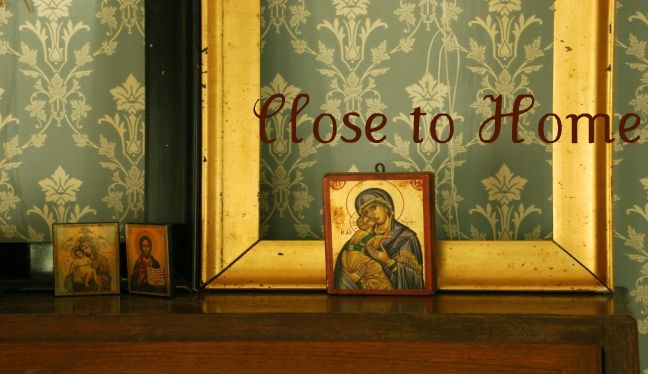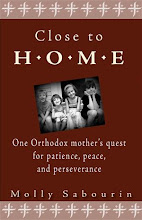
For weeks I avoided picking it up, even as her lovely face stared me down from its cover, from the spot on my nightstand I had placed it as a reminder that I should read this book and be amazed by the courage of its heroine. But I was scared to; there was part of me that was convinced if I examined and related to her story my own fate would mirror hers and I would die an early death just like she did. It is foolish and irrational to think this way; one can certainly miss out on an abundance of spiritual treasures by avoiding what is difficult or unpleasant. It was due to my respect for her family, her friends, her legacy, that I was finally able to get over myself and meet intimately, through her journal entries and website postings, an extraordinary and humble and beautiful and wise individual who met Christ as He is (rather than how we assume He should be) through suffering.
Lynette’s Hope is the title. It was edited and compiled by her dear friend, Father Luke Veronis, and published by Conciliar Press. This memoir of sorts is like a window into a soul being purified by fire. Lynette Hoppe, a mom to two young children, a devoted wife, and a missionary to Albania was not above us in her capacity to feel fear, pain, or disappointment and because of that her emotions and inner wrestlings cut straight to the core of my being in a way that hypothetical ponderings can never quite. If any scenario has the ability to shake up my beliefs, it is that of a mother being taken from her still very dependent loved ones. While reading in first person the thoughts of a woman living out and coming to terms with my greatest of worries, I was touched profoundly and even permanently altered by the words and sentiments she eloquently left behind as a gift to all of us who want so badly to be convinced that Christ is really and truly able to carry us through the roughest of storms and into the quiet of calmness and everlasting safety.
I know it is tempting, wrote Lynette in the Fall of 2005, for people to think that their prayers are not being answered because I have not been healed of cancer. But the truth is that prayers are being answered in the most miraculous of ways – perhaps not for healing of body, but certainly for healing of soul. I know that it is tempting for myself to think only in terms of physical and material prosperity when it comes to deliverance and wellness - that being blessed means being happy and comfortable. Oh the sadness and the guilt that I encounter when faced with news of someone in the throes of a wearisome situation. That could be me! I selfishly internalize, Why wasn’t it me? I can’t imagine being struck by such sorrow! Lord have mercy, make it stop; that is too much of a burden for me, I mean for anyone, to carry!
What I learned through Lynette’s experience, however, is that within the intensity of such pain and utter dependence upon God there is unearthly clarity for those who are willing to view their trials as a means to salvation, as opposed to a form of punishment or grotesque unfairness. As the peripherals in Lynette’s life were made obsolete by her increasing lack of energy and spiritual awareness, her revelations became ever more momentous and remarkable. After months of serenity and an illogical type of joy, Lynette fell prey to despair and my own spirit sank as she recounted her anxiousness at hearing nothing but the echo of her desperate prayers against the hollowness of newly acquired doubts. An existential angst, she wrote, gripped me, something foreign to me, as I have never struggled with God’s existence. God has always been real to me, and so to face the question of his existence now seemed to me a kind of failure, a sign that here, at the end, I would fall from faith. Why, I wondered, would God appear to distance Himself after all of her efforts to stay loyal, to remain a witness to His mercy in the midst of a monumental struggle? I wanted to be assured that in such a state of torment Heaven would override the horror of having to leave behind a sweet and wanted life and forcibly dull the sharpness of a soul being sheared of its body. Lynette fasted; she stopped trying and began waiting on Christ. During this time, Lynette remembered, I started to feel that it wasn’t right for me to pray for my own healing, but at the time I so desperately wanted to be healed. I felt that all my prayers were motivated strictly by the desire to gain favor in the sight of God so that he would heal me. My sincerity in prayer sputtered like a wet candle wick.
Eventually, Lynette would understand that the darkness gripping her so tightly was an outward attack and not a collapse from within. Father Veronis would bring to light for her the “Blessed are the Poor in Spirit” beatitude and she would be comforted. The image that came to my own mind when reading this passage about an already crippled yet godly individual becoming still more broken and then refined, was that of a house that when one first enters appears neat and tidy and perfect, especially when compared to a neighbor’s trashed bungalow with the clutter and the junk and the rusted out cars in the driveway; how simple it is to look around town for a bigger mess than your own and be satisfied. Yet the inherent isolation of dying removed completely from Lynette the option of escaping the dust and debris in her own life through busyness and voyeurism. The all-encompassing magnitude of her cancer became a spotlight uncovering grime and soot she never knew existed within the previously unexplored crevices of her character. Oh my, I suddenly realized, God was not letting Lynette down, He was allowing her to be cleansed out of love; He was preparing her for her entrance into His Kingdom.
Most of us believe, I would venture to guess, that on our own we could never be faultless enough or holy enough or disciplined enough to wriggle our way out of sinfulness and into our Savior’s good graces. But if you’re anything like me, there are moments when that charitable act of kindness or an episode of self-restraint will have you breathing a little easier about your prospects for being saved in the end from hell. That smugness that can turn instantly into fright when our sincerity turns on or off depending on our mood or present circumstances seems the hardest thing to be extricated from on this journey toward Christ and eternal life. Lynette, by the end, would be emancipated from the ups and downs of confidence giving way to despondency. Just thirteen days before her passing, she put the following statement on her website, one I’ve yet to read without awe or tears of hopefulness:
When I first got the news of my pending departure, I was frantic, thinking I needed to do some kind of “ministry,” but I soon realized that there was no value in ministry at this point. What I have done until now is what I have done. What I have become is what I am. To try to have some kind of dramatically different prayer life is simply an attempt to “win his favor” and would actually be rather artificial. I am allowing myself to simply relax in the love of Jesus, to enjoy him in a new way, to think about joining him soon. I have so much peace in thinking there is nothing I can do to win over Christ. All I can do is throw myself into his arms and know that it is only through the work of Christ that I can be saved. I feel that I am ready to die a “painless, blameless, and peaceful death” even as we pray every liturgy. I may have a lot of physical pain, but in spirit I feel no pain, other than leaving those I love.
How fortunate we are to have access to such precious and honest reflections from a warrior, a marathon runner for Christ. May her refusal to give up on either herself or her Creator continue to affect my everyday choices and personal meditations. Dear Lynette, I want to thank you for sharing your voyage with those of us still longing to make sense of it all. I pray for the continued mending of those who were closest to you and that your memory will indeed be eternal!
Lynette’s Hope is the title. It was edited and compiled by her dear friend, Father Luke Veronis, and published by Conciliar Press. This memoir of sorts is like a window into a soul being purified by fire. Lynette Hoppe, a mom to two young children, a devoted wife, and a missionary to Albania was not above us in her capacity to feel fear, pain, or disappointment and because of that her emotions and inner wrestlings cut straight to the core of my being in a way that hypothetical ponderings can never quite. If any scenario has the ability to shake up my beliefs, it is that of a mother being taken from her still very dependent loved ones. While reading in first person the thoughts of a woman living out and coming to terms with my greatest of worries, I was touched profoundly and even permanently altered by the words and sentiments she eloquently left behind as a gift to all of us who want so badly to be convinced that Christ is really and truly able to carry us through the roughest of storms and into the quiet of calmness and everlasting safety.
I know it is tempting, wrote Lynette in the Fall of 2005, for people to think that their prayers are not being answered because I have not been healed of cancer. But the truth is that prayers are being answered in the most miraculous of ways – perhaps not for healing of body, but certainly for healing of soul. I know that it is tempting for myself to think only in terms of physical and material prosperity when it comes to deliverance and wellness - that being blessed means being happy and comfortable. Oh the sadness and the guilt that I encounter when faced with news of someone in the throes of a wearisome situation. That could be me! I selfishly internalize, Why wasn’t it me? I can’t imagine being struck by such sorrow! Lord have mercy, make it stop; that is too much of a burden for me, I mean for anyone, to carry!
What I learned through Lynette’s experience, however, is that within the intensity of such pain and utter dependence upon God there is unearthly clarity for those who are willing to view their trials as a means to salvation, as opposed to a form of punishment or grotesque unfairness. As the peripherals in Lynette’s life were made obsolete by her increasing lack of energy and spiritual awareness, her revelations became ever more momentous and remarkable. After months of serenity and an illogical type of joy, Lynette fell prey to despair and my own spirit sank as she recounted her anxiousness at hearing nothing but the echo of her desperate prayers against the hollowness of newly acquired doubts. An existential angst, she wrote, gripped me, something foreign to me, as I have never struggled with God’s existence. God has always been real to me, and so to face the question of his existence now seemed to me a kind of failure, a sign that here, at the end, I would fall from faith. Why, I wondered, would God appear to distance Himself after all of her efforts to stay loyal, to remain a witness to His mercy in the midst of a monumental struggle? I wanted to be assured that in such a state of torment Heaven would override the horror of having to leave behind a sweet and wanted life and forcibly dull the sharpness of a soul being sheared of its body. Lynette fasted; she stopped trying and began waiting on Christ. During this time, Lynette remembered, I started to feel that it wasn’t right for me to pray for my own healing, but at the time I so desperately wanted to be healed. I felt that all my prayers were motivated strictly by the desire to gain favor in the sight of God so that he would heal me. My sincerity in prayer sputtered like a wet candle wick.
Eventually, Lynette would understand that the darkness gripping her so tightly was an outward attack and not a collapse from within. Father Veronis would bring to light for her the “Blessed are the Poor in Spirit” beatitude and she would be comforted. The image that came to my own mind when reading this passage about an already crippled yet godly individual becoming still more broken and then refined, was that of a house that when one first enters appears neat and tidy and perfect, especially when compared to a neighbor’s trashed bungalow with the clutter and the junk and the rusted out cars in the driveway; how simple it is to look around town for a bigger mess than your own and be satisfied. Yet the inherent isolation of dying removed completely from Lynette the option of escaping the dust and debris in her own life through busyness and voyeurism. The all-encompassing magnitude of her cancer became a spotlight uncovering grime and soot she never knew existed within the previously unexplored crevices of her character. Oh my, I suddenly realized, God was not letting Lynette down, He was allowing her to be cleansed out of love; He was preparing her for her entrance into His Kingdom.
Most of us believe, I would venture to guess, that on our own we could never be faultless enough or holy enough or disciplined enough to wriggle our way out of sinfulness and into our Savior’s good graces. But if you’re anything like me, there are moments when that charitable act of kindness or an episode of self-restraint will have you breathing a little easier about your prospects for being saved in the end from hell. That smugness that can turn instantly into fright when our sincerity turns on or off depending on our mood or present circumstances seems the hardest thing to be extricated from on this journey toward Christ and eternal life. Lynette, by the end, would be emancipated from the ups and downs of confidence giving way to despondency. Just thirteen days before her passing, she put the following statement on her website, one I’ve yet to read without awe or tears of hopefulness:
When I first got the news of my pending departure, I was frantic, thinking I needed to do some kind of “ministry,” but I soon realized that there was no value in ministry at this point. What I have done until now is what I have done. What I have become is what I am. To try to have some kind of dramatically different prayer life is simply an attempt to “win his favor” and would actually be rather artificial. I am allowing myself to simply relax in the love of Jesus, to enjoy him in a new way, to think about joining him soon. I have so much peace in thinking there is nothing I can do to win over Christ. All I can do is throw myself into his arms and know that it is only through the work of Christ that I can be saved. I feel that I am ready to die a “painless, blameless, and peaceful death” even as we pray every liturgy. I may have a lot of physical pain, but in spirit I feel no pain, other than leaving those I love.
How fortunate we are to have access to such precious and honest reflections from a warrior, a marathon runner for Christ. May her refusal to give up on either herself or her Creator continue to affect my everyday choices and personal meditations. Dear Lynette, I want to thank you for sharing your voyage with those of us still longing to make sense of it all. I pray for the continued mending of those who were closest to you and that your memory will indeed be eternal!







